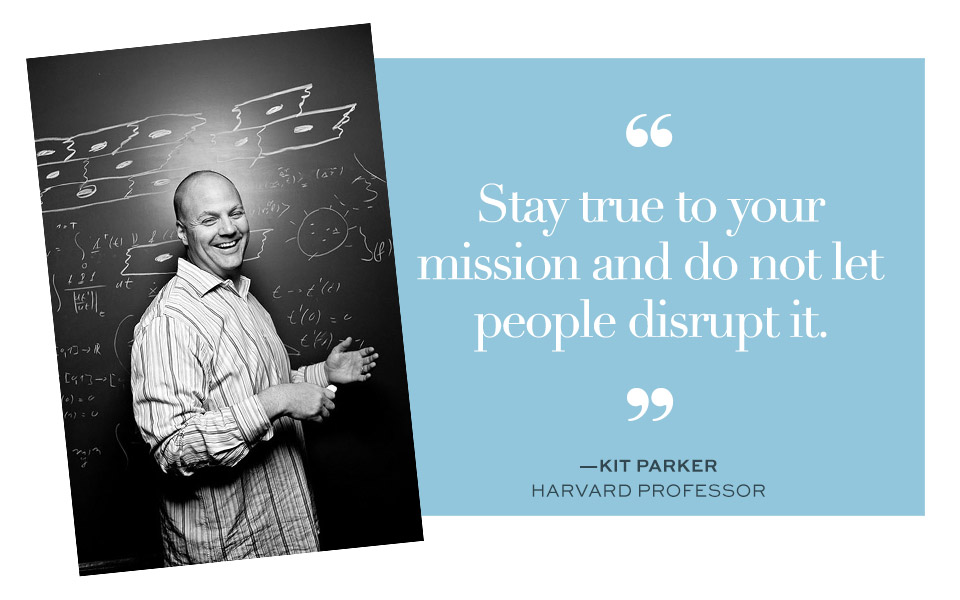
Think you know what innovation means, and what it takes to be a true innovator? Just wait till you read our interview with Harvard Professor Kit Parker, who has some very captivating things to say about the subject. Then again, we wouldn’t expect anything less from a man with a CV as fascinating as his. Not only is Parker a Harvard Bioengineering and Applied Physics Professor, Director of its Disease Biophysics Group, and a Core Faculty Member at the Wyss Institute for Biologically Inspired Engineering, but he’s also a Lieutenant Colonel in the U.S. Army and, oh, just happened to teach a course this past semester on building the ultimate BBQ smoker. The guy is a genius, who’s effecting very real changes in the world with his research in topics as varied as tissue regeneration, nanotechnology, counterinsurgency tactics… Read for yourself and be inspired.
The science bug bit when…
I’m fortunate that I’m doing mostly the things I did as a child. I had a Sears chemistry set and a second-hand microscope that my grandfather got for me. I’d scoop up road kill or find things — this is rural Texas, so frogs, toads, rabbits, you name it — and bring them back, dissect them, look at them…
My focus at Harvard…
My group focuses mostly on diseases that affect children. Diseases that affect older people are, a lot of times, diseases of abuse. People smoke cigarettes, they overeat, they don’t exercise… But with children, it’s pure disease — those are the most intellectually challenging diseases. We’re helping, for example, to make heart valves for babies who have malformed hearts.
About my stint in the army…
I’m very susceptible to good advertising and I watch a lot of NASCAR… and the army advertises during NASCAR events. Actually, service is a consistent theme in our family. I joined the army to give back. When you do something to give back, you end up getting much more in return. Through the army, I’ve gotten a lot of good friends and a new appreciation for things.
And how that time impacts what I do now…
When I came back from the war and started at Harvard, in 2003, I didn’t want to be, like, the veteran on campus, so I left everything in the war behind and focused on looking at heart disease. Then a buddy of mine got wounded pretty badly, and I got very frustrated with the way he was being treated. So I started doing some research into traumatic brain injury, which, it turns out, was consistent with my group’s move into pediatric disease; it’s the leading cause of death for children. I went back and dug up a patrol book from my first time in Afghanistan. In it, I had kept this list of everything that pissed me off during the war. I said, “I’m going to do one paper, one project on each thing that made me upset.” It’s sort of putting all this baggage away once and for all. I was upset about our uniforms, so we did a paper on how the cuttlefish camouflages itself. I saw a kid get burned, so we’re spending a bit of time on wound dressings…
And my work in counterinsurgency…
We practiced counterinsurgency over in Afghanistan, but no one was doing any science behind it — we had all these young people who were getting killed and no one was really diving deep into what it means to do counterinsurgency. Then some army buddies of mine, who were in the police, were fighting a bad gang problem in Springfield, MA — I proposed using the city as a laboratory. We teamed up and made progress against the gangs, learned quite a bit about counterinsurgency and spun out a company making software that the police and military can use for counterinsurgencies.
Harvard Bioengineering and Applied Physics Professor, Director of its Disease Biophysics Group, Lieutenant Colonel in the U.S. Army, Core Faculty Member at the Wyss Institute for Biologically Inspired Engineering — how I explain what I do…
I had insight recently from a student who likes fashion engineering. She said, “I don’t know if I’m interested in fashion or engineering — or if I’m interested in good design.” I thought, that kind of describes me. I do tissue engineering, I build stuff out of cells, this semester I’m teaching a class on BBQ… How would I describe myself? I would say I’m trying to be innovative and trying to be creative. I like to work on really hard problems — whether it’s making a heart valve for a baby or fixing an inner-city neighborhood that’s really struggling.
And to be innovative…
When I think about innovation, I think about the cutting edge — and the cutting edge is a very uncomfortable place to live. You are criticized, you will fail a lot, it’s a risk. When I talk to my students about this, I tell them that to be an innovator, you have to be able to live with a certain level of discomfort, to risk public scorn, professional catastrophe. The idea is to accept this discomfort in the name of getting something done, of doing something so profound that people’s lives are changed.
One moment when I felt shaken…
Nearly every day! I barely graduated from college; I had a C+ average. When I applied to my first post-doctorate fellowship, I got turned down.
And how I overcame the above…
You have to stay true to your mission and do not let people disrupt it. When I got turned down for that post-doctorate fellowship, I wrote the guy and said, “Hey, I’m coming anyway. Get ready.” I showed up and he gave me the job.
The difference between an innovator and someone who comes up with good ideas…
Leadership. Being able to develop a vision, communicate a vision, recruit a team and so on — that’s an innovator.
My advice to foster good innovators…
I was in a meeting with special ops command a few years ago and they were talking about how to reward innovators — with a certificate, a medal, whatever. But the only thing you can give a real innovator is the freedom to operate. So if you’re a boss and you have someone underneath you who is really creative, your primary job is to keep them out of trouble. That’s my biggest advice — the freedom to operate is more important than anything else for the true innovator.
The importance of mentorship…
I think there’s a huge responsibility on mentors. An encouraging word to somebody at the right time can do a lot. One of the most encouraging words I ever got was from a scientist, Keith Burridge. I was a graduate student and climbed into an elevator with him — I was basically stalking him after he gave a talk — and had about four floors to tell him about my crazy ideas. For him, it was probably an inconsequential exchange in an elevator with a student. But for me, it was a thunderbolt. Every time I see him at a conference now, I thank him. So mentoring that kid with the freaky ideas is important.
Surround yourself with…
You should surround yourself with people who live by the values of honor and integrity that you aspire to. In the military, you have the people who are careerists and the people who are warriors. Careerists — they want the fancy badges, the cool assignments. Warriors — they want to get it on, they’re looking for the fight. It’s the same in the sciences. There are the people who want the fancy awards, the fancy business cards… and then you have the scientists, the folks who just want the answer. Surround yourself with those purists — the real warriors, the real scientists.
Top innovators now…
Elon Musk — this guy might not just replace fossil-fuel cars but antiquate the power grid because the battery technology in his Tesla is so great, you don’t plug your car into your house to power up the car, you power up your house with the energy saved in the battery of the car. I mean, to antiquate an entire piece of the nation’s infrastructure — that’s extraordinary.
Larry Page and the guys at Google — they’ve got the mojo, they’ve got the secret sauce. One of the things I really enjoy about Google is that creative play is a corporate ethic — that is a big deal.
David Edwards — he’s one of the most creative people out there. He’s a friend of mine, a professor at Harvard, who wrote a book called Artscience and has a center called Le Laboratoire in Paris and Cambridge. He looks at the science-art interface. At Le Laboratoire, he brings together an artist and a scientist in residence and they have to do something. Have you heard about inhalable chocolate? Le Laboratoire came up with that.
Best career advice…
Don’t ever quit — that’s the most important thing. Because you will never win, you will never conquer if you do.
And to inspire a love of science in your children…
You’ve got to expose them, encourage them, spend time with them and you’ve got to lead by example. Feed that kind of creativity. I take my daughter to the lab in Harvard. She has a lab notebook, a perfume science kit… That old microscope I had as a child? It’s set up for my daughter now in my office.
More to explore in Culture
-
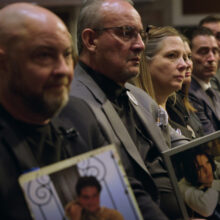 Culture
4.21.25
Word of Mouth: ‘Can’t Look Away’
Culture
4.21.25
Word of Mouth: ‘Can’t Look Away’
-
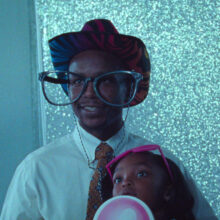 Culture
10.24.24
Word of Mouth: ‘Daughters’ on Netflix
Culture
10.24.24
Word of Mouth: ‘Daughters’ on Netflix
-
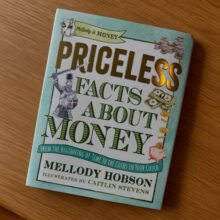 Culture
10.24.24
Financial Literacy for Kids? It’s Priceless.
Culture
10.24.24
Financial Literacy for Kids? It’s Priceless.
-
 Culture
11.22.23
What’s Your Sign? Sagittarius
Culture
11.22.23
What’s Your Sign? Sagittarius
-
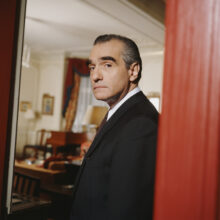 Culture
10.19.23
What’s Your Sign? Scorpio
Culture
10.19.23
What’s Your Sign? Scorpio
